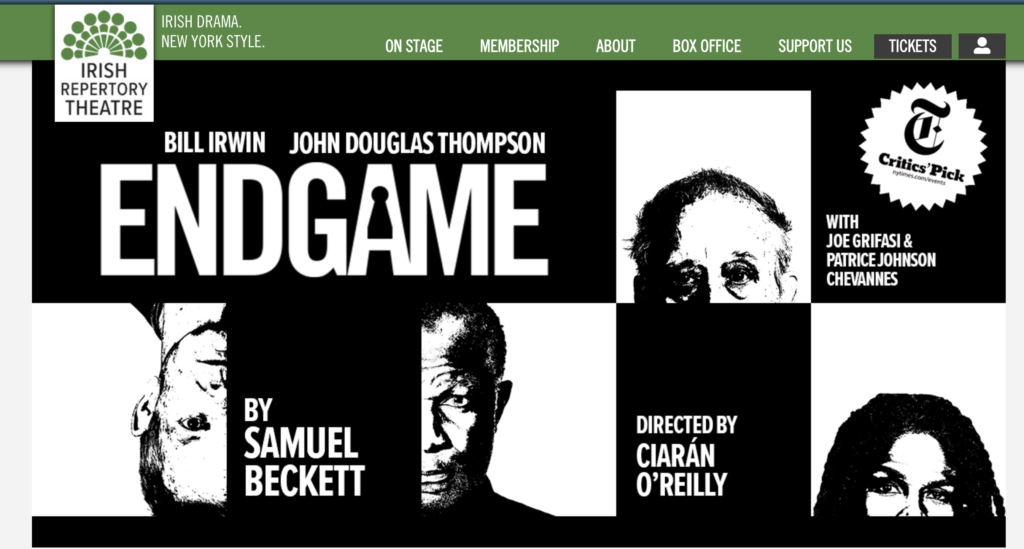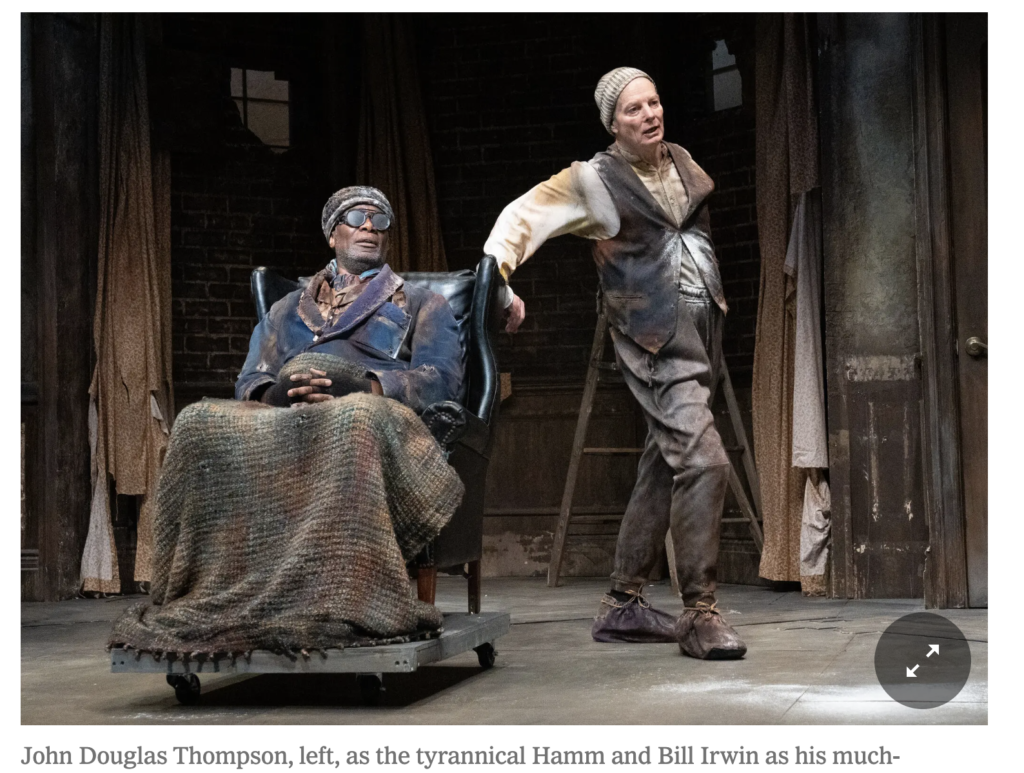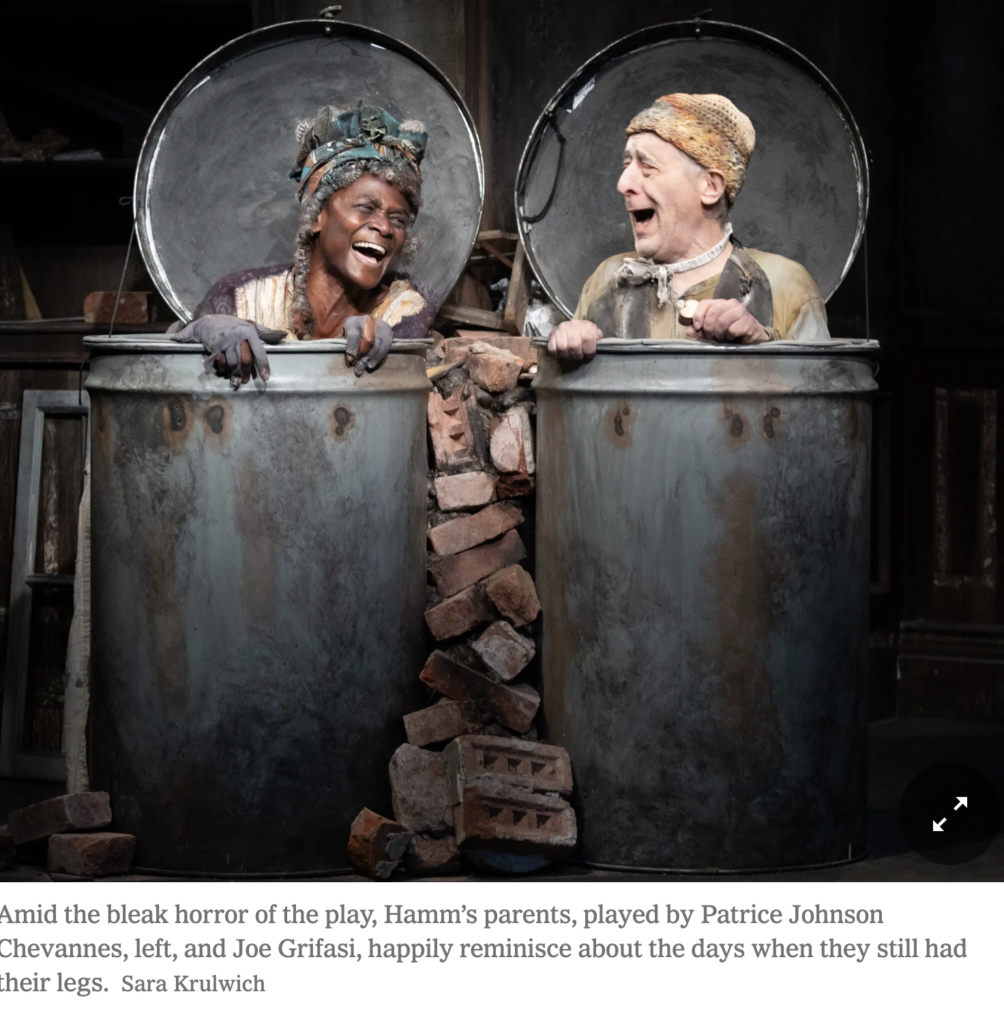Green baseball caps in the audience snuck in a little St. Paddy’s Day festive color, but Beckett’s stripped down refusal to look away from darkness soon settled the house into a chastened silence. Endgame‘s semi-chorus sounds echoingly familiar, almost like Beckett parodying Beckett: “You’re on Earth. There’s no cure for that.” So why did I drive home inside a swirl of imagination?

The short answer is that I’ve rarely seen four better performances on one small stage at the same time.
I was there because I’d never seen a production of this tragedy, though I distinctly remember being blown away by it in college in the 1980s. And I was also there to see John Douglas Thompson play the part of Hamm, immobilized patriarch and tyrant, who bellows his bitterness at his parents — his father Nagg, who he calls “fornicator,” and his mother Nell, both famously confined in garbage cans during the entire performance — and especially at his resentful servant Clov. Thompson’s Hamm was magisterial – I’ve been watching him perform for years, including an astonishingly physical Tamburlaine at Theater for a New Audience in 2014, an open-hearted Satchmo in New Haven, and more recently as Shakespeare’s Kent (2019) and Shylock (2022) in NYC. He’s one of the most generously emotional actors I’ve ever seen; he gathers the whole house into his feelings. As embittered, blind, immobile Hamm, who enjoys lashing out at his father and his servant, Thompson’s empathy-machine is restrained but indomitable. The music of his voice, gestures of his hands, his efforts to get Clov to position his chair just exactly at center stage – it’s hard to imagine a more compelling presentation of rage, confinement, and comic aggression. I suspect I’m not the only one who can’t wait to see his King Lear!
Thompson’s Hamm somehow managed to be both overwhelmingly emotional and palpably restrained. His immobility played against the complex physicality of Bill Irwin’s Clov, who resents his master, serves him, and in the end can’t leave but also won’t reveal his lingering presence to unseeing Hamm. It’s hard to describe the movement patterns of Irwin’s Clov – he managed to make his legs appear as both functional and also structural impediments, moving awkwardly across the stage and up the folding later to the two windows Beckett insisted were the only possible set elements. Clov plays in Hamm’s shadow, but with his expressive clown-trained body he works in comic tension with his master urge to dominate. Through Irwin’s Clov, and especially through his frayed but tangible connection to Hamm, the painful comedy of endurance of Beckett’s undersong shows itself. “There’s nothing funnier than unhappiness, I grant you that. Yes, yes, it’s the most comical thing in the world.”

A more nostalgic and sentimental form of comedy comes from the parents-in-garbage-cans, played by the engaging Joe Grifasi and dazzling Patrice Johnson Chevannes. They reminisce about their lives before they were frozen into stage-cans, and before Chevannes’s Nell apparently dies (or at least vanishes inside her can and stops responding) they present a glimpse of light that can’t quite touch the painful duet of Hamm and Clov.
Like Laura Collins-Hughes in the Times, I appreciated the play’s comic touches, even or perhaps especially the bitter ones. But my lasting image of the show features Thompson returning a stained cloth – “old stauncher!” – to his unseeing eyes while Clov, dressed to travel but remaining in place, stares with us as the set fades to black. Might the whole thing be Beckett’s refusal of the advice that Kent gives to his master in act 1: “See better, Lear!” Instead, how about we don’t see at all!

I talked briefly with Irwin and Thompson after the show, since I was also catching up with my friend Ayanna Thompson, who knows everyone. They both mentioned that a hearing aid started buzzing a few times during the performance, and Thompson, who played Hamm’s blindness behind dark goggles that meant he really could not see, got disoriented. Irwin’s Clov tried, successfully as far as we in the audience could tell, to feed the lines that momentarily vanished. There’s something about that stage moment – an actor loses his way, and must rely on his co-star, who of course can’t speak the missing lines, only prompt them – that seems powerfully consonant with Beckett’s unsettling vision of the world as almost-empty stage. What is there to do, as the world doesn’t quite end, but talk, and listen, and help our fellows find the right words?
The website says the show must close on April 16! Get there if you can!